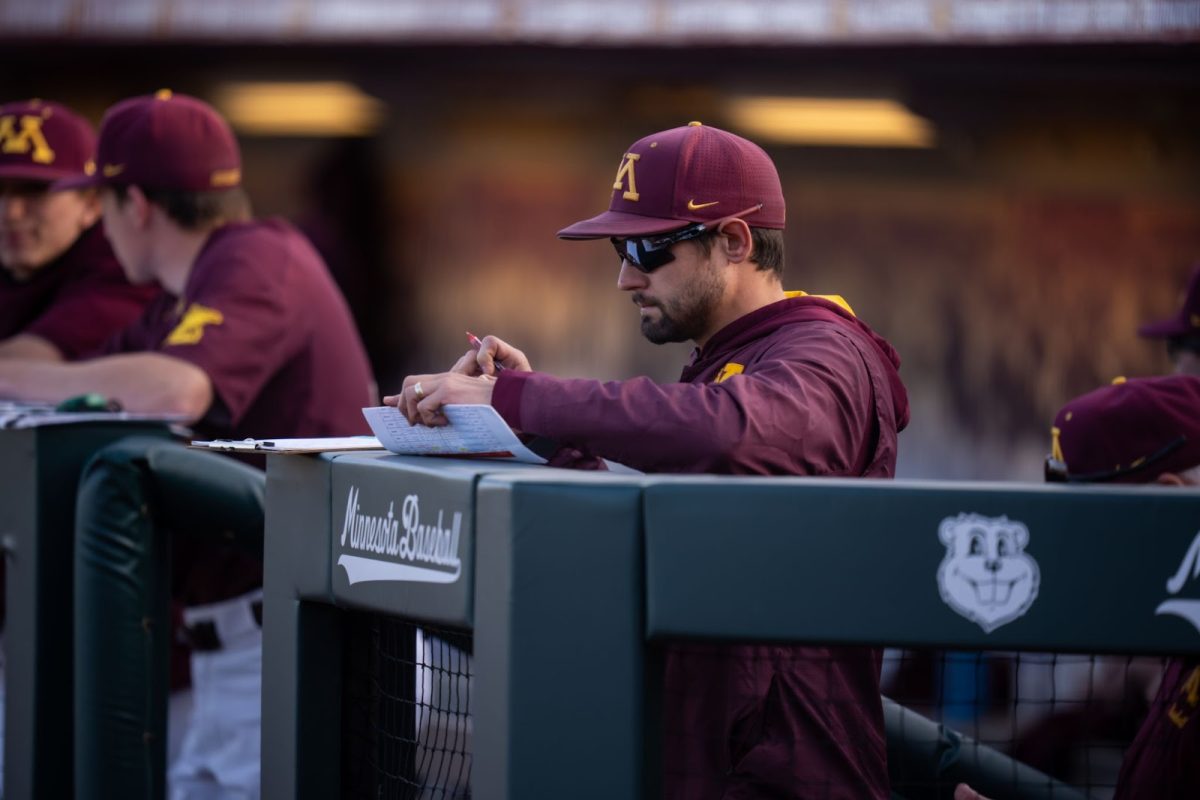In 2005, baseball coach John Anderson and sports psychologist Rick Aberman collaborated to write a book on coaching.

Iowa
when: 6 p.m. today, 1 p.m. Saturday, and 1 p.m. Sunday
where: Iowa City
The book, called “Why Good Coaches Quit: How to Deal With the Other Stuff,” highlighted many of Anderson’s coaching dogmas, which have helped him become one of the most respected coaches in college baseball. He has been named Big Ten Coach of the Year five times and, last year, was inducted into the American Baseball Coaches Association Hall of Fame.
At the heart of both the book and his coaching tactics is the belief that people shouldn’t get too worried about winning or losing, but only whether or not they are “respecting the game” in how they approach it.
That has been drilled into the head of anyone who has played for Anderson.
“If you know anything about the program, you know it’s always about the process and never about the result,” outfielder Mike Kvasnicka said. “If you talk to anybody who has Gopher baseball stuff on, they’ll somehow work that into what they’re saying.”
Those beliefs have yielded a lot of success for Anderson in his career as Minnesota’s head coach. He has led the program to a school-record 962 wins, 21 top-three conference finishes and eight Big Ten championships in his 27-year career.
This year, however, the team will finish with its worst record in Anderson’s tenure, and will probably be the first Gophers team to finish under .500 in 46 years.
But, true to his style, Anderson still sees what he can take out of it.
“It’s been good for me because I’ve gotten a chance to look at things differently,” he said. “When you go through failure and adversity you start to look at everything differently. You watch how the players handle it and you have to coach differently than when it’s going well.
“I haven’t had this in my coaching career, so it’s been interesting. It doesn’t mean I like it, or it’s any fun, but you have to take out of it what you can to help yourself grow and get better as a coach, and be able to help your players, so it doesn’t happen again.”
Currently in last place in the Big Ten, the chances of finishing in one of the top six spots and making an 11th straight conference tournament appearance are unlikely.
Anderson said the weight of these streaks may have something to do with the team’s snowballing – they’ve lost seven straight games and 10 of their last 11 – and that it might be “cleansing” for the team to start a new streak.
“You get haunted a little, here, with all your success and your history and tradition,” he said. “The kids feel the pressure. Everybody outside the program is saying, ‘What’s going on? How come we’re not winning more?’ “
“Everybody wants us to win more, but you have to stay connected to who you are. We know what’s going on here, and we know what the issues are. We lost a lot of players last year and we knew this wasn’t going to be an easy season, by any means. It is what it is, and so I’m not surprised by the things that have gone on.”
This weekend, they travel to play Iowa, which is tied with the Gophers for last place, but then host first-place Michigan and sixth-place Purdue.
This weekend’s series will be critical for the team’s tournament chances, but the players are looking at it the way their coach has taught them.
“If we do, by chance, put it together and get on a roll the last couple weeks, then we could make a push to make the tournament, and that’d be great,” Kvasnicka said. “But if we do the same thing, and the bounces still don’t go our way, and we lose a couple tough games or run into a couple tough pitchers and we don’t make the tournament, we still did all we could.”
That’s the heart of Anderson’s coaching theory: Take all you can out of every situation, and don’t judge your results based on the scoreboard.
It has worked in 26 of his 27 seasons, and Anderson is confident it will continue to work.
“We have really good leadership that keeps us in check, saying, ‘That’s the game. If you can’t control it, don’t get too worked up about it,’ ” catcher Jeff DeSmidt said. “That’s what Coach does.”
You might say he wrote the book on it.
















